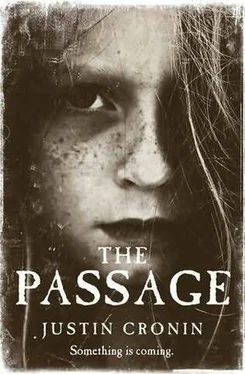By midmorning the air had warmed again; the snow had melted away. On the map, the next town was named Placerville. Eight days had passed since they’d seen the body of the cat in the trees. The feeling that something was following them had dissipated over the long days of walking, the silent, star-strewn nights. The farmstead was a distant memory; the Haven, and all that had occurred there, seemed like years ago.
They were tracing a river now. Peter thought it was the Dolores, or the San Miguel. The road was long gone, absorbed by the grass, the wash of earth and time. They marched in silence, two rows of three. What were they looking for, what would they find? The journey had acquired a meaning of its own, intrinsic: to move, to keep moving. The thought of stopping, of reaching the end, seemed beyond Peter’s power to imagine. Amy was walking beside him, her back sloped forward against the heft of her pack, her sleeping sack and winter jacket lashed to the bottom of the frame. She was dressed, like all of them, in clothing scavenged at Outdoor World: a pair of gaps cinched to her hips and, on her upper body, a loose-fitting blouse of red and white checks, the sleeves unsnapped and flapping around her wrists. On her feet, a pair of leather sneakers; her head was bare. She had given up the glasses long ago. She kept her eyes forward, squinting against the brightness. In the days since they’d left the farmstead, a shift had occurred, subtle but unmistakable. Like the river, she was leading them now; their job was simply to follow. With each passing day, the feeling grew stronger. Peter thought, as he often did, of the message Michael had shown him, that long-ago night in the Lighthouse. Its words formed a backbeat to the rhythm of his walking, each footfall carrying him forward, into a world he didn’t know, into the hidden heart of the past, to the place where Amy came from.
If you found her, bring her here. If you found her, bring her here .
He had discovered, in the days since they’d left the farmstead, that he did not miss Theo as he’d thought he would. As with the Haven and all that had happened before it-even the Colony itself-thoughts of his brother seemed to have fallen away, subsumed like the grassy road by the project of simply moving forward. At first, that night when Theo and Maus had called them all together and announced their decision, Peter had been angry. He had not shown this, or hoped he hadn’t. Even in the midst of it, he knew this anger was irrational; it was obvious that Maus could not continue. Part of him simply didn’t want his brother to leave him again so soon. But Theo had the facts on his side, and in the end, Peter could only agree.
But he had also come to see, over the days, a deeper truth behind his brother’s decision. His path and Theo’s had been destined to diverge again, because their cause was not the same. Theo did not seem to doubt their story of Amy, or at least he had said nothing to make Peter think so. He had absorbed Peter’s explanation, fantastic as it was, with no more or less skepticism than it deserved. Yet Peter could detect in his brother’s compliance a feeling of detachment; Amy meant nothing to him, or meant very little. If anything, he seemed a little afraid of her. It was clear that he had come as far as he had only because that’s where the group was headed; at the first opportunity, and under the circumstances of Mausami’s pregnancy, he had quickly given this up. Selfishly, Peter would have wished for more, if only for Theo to have expressed some regret, however small, at their separation. But he hadn’t done this. The morning of their departure, as the six of them had walked away from the farmhouse, Peter had turned to see his brother and Mausami watching them. A small thing, but it had seemed important to Peter that Theo remain where he was, standing on the porch, until the six of them were out of sight. But when Peter looked again, his brother was gone; only Mausami was there.
When the sun was high they stopped to rest. They could see the line of mountains plainly now, a rugged bulk against the eastern skyline, the peaks dolloped in white. The day had grown warm again, enough to make them sweat; but up high, where they were going, winter had already arrived.
“More snow up there,” Hollis said.
He was sitting beside Peter on a fallen log, its rotted bark blackened with dampness. No one had spoken a word in at least an hour. The others were scattered around, all except Alicia, who had gone ahead to scout the terrain. Hollis knifed open a can and begun to spoon the contents to his mouth, some kind of shredded meat. A bit got caught in the coarse tangle of his beard; he wiped it away, washed the last of his meal down with a long, throat-pumping drink of water, and passed the can to Peter.
Peter took the can and ate. Sara, sitting across from him with her back against a tree, was writing in her book. She paused, her eyes focused intently at what she’d written; her pencil was just a nub, almost too short to hold. While Peter watched, she drew her blade from her belt, scraped it across the tip, and then resumed her patient scribbling.
“What are you writing about?”
Sara shrugged, hooking a stray strand of hair behind her ear. “The snow. What we ate, where we slept.” She lifted her face to the trees, squinting into the sunlight descending through the sodden branches. “How beautiful it is here.”
He felt himself smile. How long had it been since he’d smiled?
“I guess it is, isn’t it?”
A new feeling seemed to have come over Sara since they’d left the farmstead, Peter thought, an unhurried calm. It was as if she had decided something and, in so doing, had moved more deeply into herself, into a state beyond worry or fear. He felt a flicker of regret; watching her now, he realized how foolish he’d been. Her hair was long and matted, her face and bare arms streaked with grime. Her nails were blackened with crescents of dirt. And yet she’d never looked more radiant. As if all that she had seen had become a part of her, infusing her with a glowing stillness. It wasn’t a small thing, to love a person. That was the gift she had offered him, had always offered him. And yet he had refused it.
Sara met his eyes then. She cocked her head in puzzlement. “What?”
He shook his head, embarrassed. “Nothing.”
“You were staring.”
Sara shifted her gaze to Hollis; the corners of her mouth lifted in a quick flash of a smile. Just a moment, but Peter felt it keenly, the invisible line of connection between the two of them. Of course. How could he have been so blind?
“It wasn’t anything,” he managed. “Just… you looked happy, sitting there. It surprised me is all.”
Alicia emerged from the brush. Balancing her rifle against a tree, she retrieved a can from the pile of packs and bladed it open, frowning at the contents.
“Peaches,” she groaned. “Why do I always get peaches?” She took a place on the log and began to spear the soft yellow fruit from the can, straight into her mouth.
“What’s down there?” Peter asked.
Juice was dripping down her chin. She gestured with her blade in the direction she had come. “About half a click east, the river narrows and turns south. There’s hills on either side, heavy cover, lots of high points.” The peaches gone, she drained the can into her mouth and cast it aside, wiping her hands on her gaps. “The middle of the day like this, we’re probably okay. But we shouldn’t hang around too long.”
Michael was sitting a few meters away on the damp ground, his back braced against a log. The days of walking had made him leaner, harder; his chin now sported a wisp of pale beard. A shotgun was resting across his lap, his finger close to the trigger.
“No sign in what, seven days?” He spoke with his eyes closed, his face tipped toward the sun. He was wearing only a T-shirt; his jacket was tied around his waist.
Читать дальше












